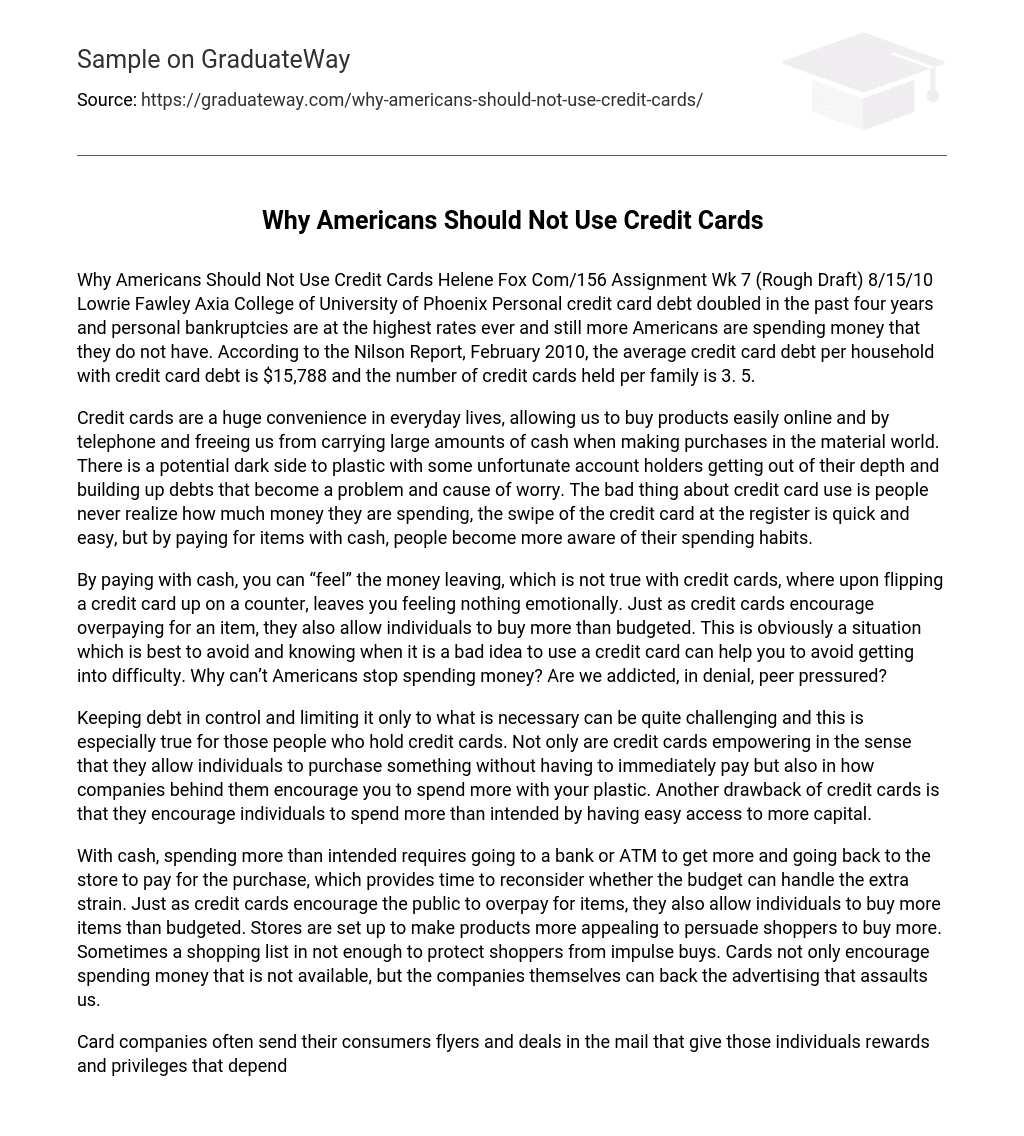Personal credit card debt doubled in the past four years and personal bankruptcies are at the highest rates ever and still more Americans are spending money that they do not have. According to the Nilson Report, February 2010, the average credit card debt per household with credit card debt is $15,788 and the number of credit cards held per family is 3. 5.
Credit cards are a huge convenience in everyday lives, allowing us to buy products easily online and by telephone and freeing us from carrying large amounts of cash when making purchases in the material world. There is a potential dark side to plastic with some unfortunate account holders getting out of their depth and building up debts that become a problem and cause of worry. The bad thing about credit card use is people never realize how much money they are spending, the swipe of the credit card at the register is quick and easy, but by paying for items with cash, people become more aware of their spending habits.
By paying with cash, you can “feel” the money leaving, which is not true with credit cards, where upon flipping a credit card up on a counter, leaves you feeling nothing emotionally. Just as credit cards encourage overpaying for an item, they also allow individuals to buy more than budgeted. This is obviously a situation which is best to avoid and knowing when it is a bad idea to use a credit card can help you to avoid getting into difficulty. Why can’t Americans stop spending money? Are we addicted, in denial, peer pressured?
Keeping debt in control and limiting it only to what is necessary can be quite challenging and this is especially true for those people who hold credit cards. Not only are credit cards empowering in the sense that they allow individuals to purchase something without having to immediately pay but also in how companies behind them encourage you to spend more with your plastic. Another drawback of credit cards is that they encourage individuals to spend more than intended by having easy access to more capital.
With cash, spending more than intended requires going to a bank or ATM to get more and going back to the store to pay for the purchase, which provides time to reconsider whether the budget can handle the extra strain. Just as credit cards encourage the public to overpay for items, they also allow individuals to buy more items than budgeted. Stores are set up to make products more appealing to persuade shoppers to buy more. Sometimes a shopping list in not enough to protect shoppers from impulse buys. Cards not only encourage spending money that is not available, but the companies themselves can back the advertising that assaults us.
Card companies often send their consumers flyers and deals in the mail that give those individuals rewards and privileges that depend on spending more. According to the article “Cards Encourage You to Overspend” on Soundmoneytips. com, people will spend more with a credit card compared to cash. In fact, a Dunn & Bradstreet study found that people spend 12-18% more when using credit cards than when using cash. McDonald’s found that the average transaction rose from $4. 50 to $7 when customers used plastic instead of cash. The pretense of making purchases with a credit card is something that does not make buying items cheaper.
In fact it can be more expensive because in of the interest rates that apply to the amount that you owe on a card. Not only are cards capable of tricking you into thinking that you are capable of handling more than what you can afford they can also come with hidden fees and penalties for not managing your bills properly and on time. Even paying off your credit cards monthly can not deter the tricky policies, which come into effect just for having the card, such as annual payments for “service,” among other vague and subtle things.
So what can you do to avoid this? If you “have to” use plastic, use a debit card and only carry enough cash to buy the things you need. Only carrying the cash you are prepared to pay for a given product will prevent you from overspending and buying the next level up as well as paying for features you do not need. If cash cannot be used, a debit card is better than a credit card because you are spending money you have rather than money you do not. They can be used for travel and for the onvenience of ordering something over the Internet or phone. Other than that, use cash. Personal finance is 80% behavior and you need to cut out habits that make you spend more. We have to accept who we are and what we can and cannot afford and many Americans tie their spending to their identity. By driving a certain car, having a certain house, and wearing certain labels, they create an image of themselves that they have to support, and that is hard to do when that is not really who you are.
Living life out of debt is the new status symbol of the middle class and the wealthy as well as being happy with whom you are instead of keeping up with the Jones. Using cash instead of credit cards you will be spending money you do have rather than money you do not have and circulating cash improves the economy. There is no positive side to credit card use and you will spend more if you use them. Even by paying the bills on time, you are not beating the system.





